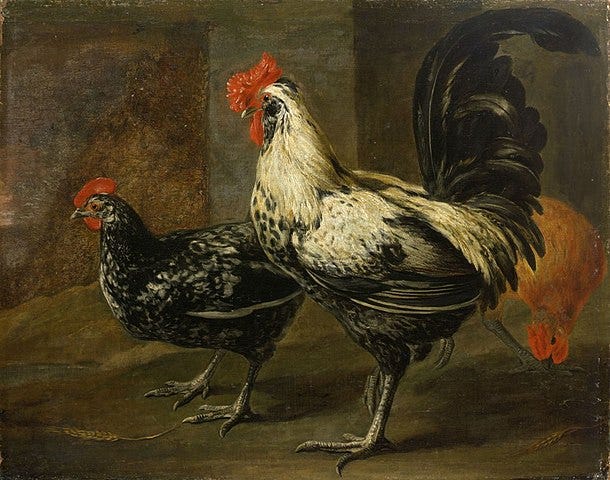Cultural Christians in the Early Church Slow Read, Week 1: Introduction
Where Sacred Chickens Meet Cultural Christians
Some good-looking chickens, but are they sacred? This is a Roman religion inside joke, by the way—read the introduction to find out more!
Words Matter. Definitions Matter.
In hindsight, one of the most important things I’ve learned in graduate school does not involve something specific to my discipline. Rather, it involves the importance of definitions. When I was starting to work on my dissertation on common soldiers in the Greco-Roman world, my adviser challenged me to define the term. It turned out to be much trickier than I expected. What makes someone a common soldier rather than a minor commander or a member of an amateur militia, for instance? Even people living in the same time and place might define certain terms differently. Likewise, in a later project, I ran into similarly prickly territory with attempting to define “civilians.”
And so, for a book on “Cultural Christians,” it is obviously key to define terms, as I do in the introduction. Because this is a term that you have likely heard before, it is also worthwhile to talk about the “baggage” we all bring into this sort of discussion. So, for instance, I describe in the introduction my own experience growing up in Israel as a cultural Jew and what this looked like in practice (e.g., skating through the empty streets and eating cheese sandwiches with friends on Yom Kippur). A friend who read parts of this book in draft form immediately thought back to her childhood in a region of the U.S. that had a lot of cultural Mormons, alongside devout ones.
So, here are the questions that I would like to pose this week, and you are welcome to answer one or all—or something in-between—whether in the comments here or in conversation with friends.
1. What comes to mind when you hear the term “cultural Christians”? How might you define the term yourself?
2. On a related note, what have been your personal experiences with cultural religion—whether in your family growing up or in your faith walk as an adult, or anything else that comes to mind that has shaped your perspective on this subject?
3. How does the introduction define “cultural Christians” and “cultural sins”? Do any particular contemporary examples that you have observed come to mind, as you consider these definitions?
4. What was the Romans’ view towards cultural religion? Why does it matter for us to understand the Roman perspective on cultural religion to be able to understand this phenomenon among Christians?
I look forward to hearing your thoughts!
Elsewhere this week
I am grateful for Front Porch Republic for publishing this essay on the many virtues of sheep in a world that denigrates sheep and overvalues flawed shepherds.
Book #3 announcement
Last but not least, now that the digital proverbial ink is all dry, I am delighted to announce that the new book project I started this past fall is under contract at Zondervan Academic. Tentatively titled Christians Reading Pagans, this is a guide for Christians on reading the Greco-Roman Classics from Homer to Boethius. My manuscript is due August 1, 2024, which would likely mean a publication date sometime in Fall 2025. More details to come in due time.





I have tended to think of cultural Christians as ones who claim the faith but don't practice it. I think a lot of this probably comes from the term cultural Catholic, which distinguishes Catholics who call themselves Catholic but rarely (if ever) go to church and may or may not believe from Catholics who are more observant. Cultural Catholics engage in some Catholic culture (esp. holiday traditions), but are not necessarily believing or otherwise observant.
Your alternative way of using the term cultural Christians in the intro (and the book overall) opened my eyes to a different way of thinking: thinking about how belonging to the wider culture affects a person's Christianity. I love this reframing, which challenged me to think about the interplay between religious practice & belief and wider culture in new ways!
I think of a cultural Christian as one who attends church regularly but places cultural-political issues as the operating identity in that person's life. For example, some progressive Christians may believe that issues such as abortion and sexual activity outside of marriage are acceptable. Conservative Christians may have a cultural-political identity that sees some politicians acting as messiahs and programs to help the poor as left wing communism. I have had one sister and brother-in law who generally were accepting of some moral isssues forbidden by Scripture. I have numerous close friends who do not favor most governmental programs which aid the poor and oppose tax increases that might provide funding for governmental services. I believe that those who oppose faithful Christian homeschooling and support for faithful Christian schools as their enemies are cultural Christians
John C. Gardner